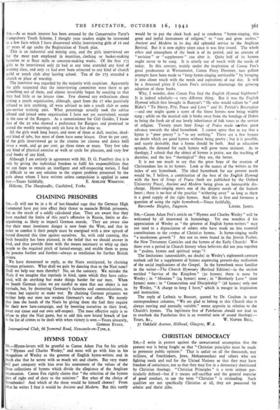HYMNS TODAY
SIR,—Hymn-lovers will be grateful to Canon Adam Fox for his article on "Hymns and Charles Wesley," and most will go with him in his recognition of Wesley as the greatest of English hymn-writers and in much else that he wrote with so much wit and charm. But very many Sill part company with him over his assessment of the values of the three collections of hymns which divide the allegiance of the Anglican torrununion. Canon Fox rightly claims that "the selection of the hymns goes of right and of duty to the minister." But what of the choice of hYmnbooks? And which of the three would he himself choose? From %hat he writes I fear it would be Ancient and Modern. But this surely would be to put the clock back and to condemn "hymn-singing, this great and joyful instrument of religion," to "rust and grow useless." Ancient and Modern in its day did splendid service to the Anglican Revival. But it is now eighty years since it was first issued. The whole ethos and atmosphere of the book is of its period, and no amount of "revision" or " supplement " can alter it. Quite half of its hymns ought never to be sung. It is utterly out of touch with the needs of today. In this century, mainly under the inspiration of Canon Fox's great predecessor at Westminster, Canon Percy Dearmer, two gallant attempts have been made to "keep hymn-singing serviceable" by bringing it into closer touch with the needs and aspirations of our day. It will be a thousand pities if Canon Fox's strictures discourage the growing adoption of these books.
Why, I wonder, does Canon Fox find the English Hymnal highbrow? It is indeed scholarly—a very different thing. But it was the English Hymnal which first brought in Bunyan's "He who would valiant he" and Blake's "To Mercy, Pity, Peace and Love" and St. Patrick's Breastplate —and one might quote a score of the finest hymns now being widely sung ; while on the musical side it broke away from the bondage of Dykes to bring the fresh air of our lovely inheritance of folk tunes to the service of religion. Twenty years later Songs of Praise made another great advance towards the ideal hymnbook. I cannot agree that to say that a hymn is "poor poetry" is "to say nothing." There arc a few hymns no doubt which are good hymns without being poetry ; but it is possible, and surely desirable, that a hymn should be both. And as education spreads, the demand for such hymns will grow more insistent. As to theology, I submit that the object of hymns is praise, not the teaching of doctrine, and the less "theological" they are, the better.
It is not too much to say that the great hope of the reunion of Christendom lies in its hymns. Look at the names of the writers in the index of any hymnbook. The ideal hymnbook for our present needs would be, I believe, a combination of the best of the English Hymnal with the best of Songs of Praise (both are published by the Oxford University Press), Ancient and Modern being given an honourable dis- charge. Hymn-singing meets one of the deepest needs of the human heart ; there is no-fear of the practice "withering away" so long as there is a good supply of the right hymns. And this is first and foremost a question of using the right hymnbook.—Yours faithfully,


























 Previous page
Previous page